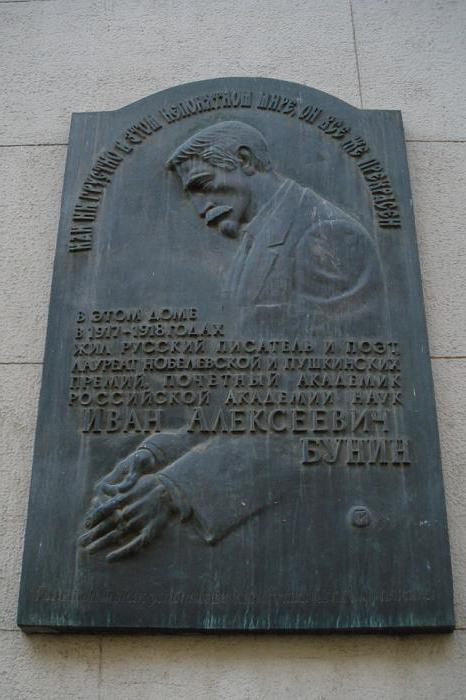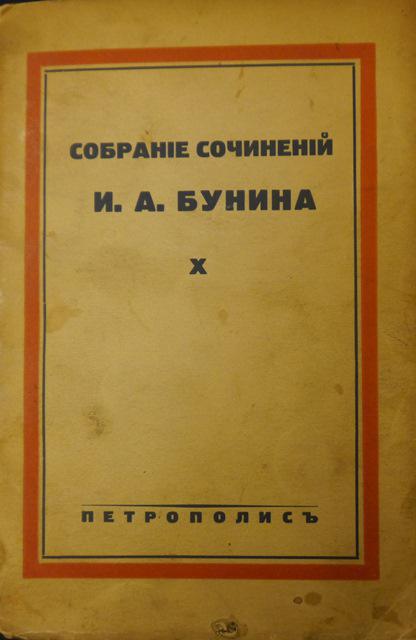We present you an overview of the work of Ivan Alekseevich Bunin "Cursed Days" - a summary of the main events about which he writes in his diary in 1918. This book was first published in 1926.
Bunin in the years 1918-1920 recorded his impressions and observations regarding the events taking place in our country at that time in the form of diary notes.
Moscow records
So, on January 1, 1918 in Moscow, he wrote that this “damned year” had ended, but perhaps something “even more terrible” was coming.
On February 5 of the same year, he noted that they had introduced a new style, so it should be already the 18th.
On February 6, a note was written about newspapers talking about the German offensive, monks pouring ice on Petrovka, and passers-by gloating, triumphing.
Next, we omit the dates and describe the main notes of Bunin in the work "Cursed Days", a summary of which is considered by us.
The story in the tram car
The young officer entered the tram car and said, blushing that he could not pay for the ticket. It was a critic Derman who fled from Simferopol. According to him, there is “indescribable horror”: the workers and soldiers walk “knee-deep in blood”, they roasted the old colonel in a firebox alive.
Bunin writes that, as they say everywhere, the time has not yet come to understand objectively, impartially in the Russian revolution. But there will never be real impartiality. In addition, our "partiality" is very valuable for the future historian, notes Bunin ("Cursed Days"). Briefly, the main content of the main thoughts of Ivan Alekseevich will be described below.
In the tram heaps of soldiers with large bags. They flee from Moscow, fearing that they will be sent to protect Petersburg from the Germans.
Bunin met a boy soldier on Povarskaya, skinny, ragged and drunk. He poked him "face in the chest" and spat on Ivan Alekseevich, saying to him: "Despot, son of a bitch!".
Someone posted posters on the walls of the houses, incriminating Lenin and Trotsky in connection with the Germans, in that they were bribed.
Conversation with floor polishers
We continue to summarize the outline of Bunin's Cursed Days. In a conversation with the polishers, he asks them a question about what will happen next in the opinion of these people. They answer that they let the criminals from the prisons that run it do not need to do this, but instead they should have been shot for a long time. When the king was not like that. But now you can’t drive the Bolsheviks away. The people have weakened ... There will be only about a hundred thousand Bolsheviks, and there will be millions of ordinary people, but they can do nothing. They would give the polishers freedom, they would pull everyone away from the flocks.
Bunin records a conversation that was overheard by accident on the phone. In it, a man asks what to do: he has adjutant Kaledina and 15 officers. The answer is: "Immediately shoot."
Again, the manifestation, music, posters, banners - and everyone calls: "Rise, working people!". Bunin notes that their voices are primitive, uterine. Women have Mordovian and Chuvash faces, men have criminal faces, and some have directly Sakhalin faces.
It is further stated that the Romans placed stamps on the faces of convicts. And you don’t have to put anything on these faces, since everything is visible without them.
Lenin's article
We read an article by Lenin. It’s fraudulent and insignificant: either the “Russian national upsurge” or the international.
The following describes the "Congress of Soviets", a speech delivered by Lenin. I read about corpses standing at the bottom of the sea. These are drowned, murdered officers. And then the Musical Snuffbox.
Lubyanka Square all shines in the sun. Liquid dirt splashes out from under the wheels. Boys, soldiers, bargain halva, gingerbread cookies, cigarettes ... Triumphant "muzzle" among the workers.
A soldier in P.’s kitchen says that socialism is now impossible, but nevertheless, the bourgeoisie must be cut.
1919 year. Odessa
We continue to describe the work of Bunin "Cursed days." A summary is made of the following further events and thoughts of the author.
April 12th. Bunin notes that it has been almost three weeks since our death. Empty port, dead city. Only today a letter of August 10 from Moscow arrived. However, the author notes, the Russian post has long ended, back in the summer of 17, when the Minister of Telegraphs and Posts appeared in a European way. A "minister of labor" appeared - and all of Russia immediately stopped working. Satan of bloodthirstiness, Cain’s anger died on the country in those days when freedom, equality and fraternity were proclaimed. Immediately came insanity. Everyone threatened to arrest each other for any contradiction.
Portrait of the people
Bunin recalls the indignation with which his allegedly "black" images of the Russian people were met at that time by those who were drunk and nourished by this literature, which disgraced all classes for a hundred years, except for the "people" and the tramp. All houses are now dark, the whole city in the dark, except for the robber dens, where balalaikas are heard, chandeliers are lit, walls with black banners are visible, on which white skulls are depicted and it says "Death to the bourgeois!"
We continue to describe the work that Bunin I.A. wrote ("Cursed days"), in abbreviation. Ivan Alekseevich writes that there are two types of people in the people. In one of them, Russia predominates, and in the other, in his expression, Chud. But in both there is a variability of appearances, moods, "precariousness". The people said to themselves that from it, as from a tree, "both a club and an icon." It all depends on who is processing, on the circumstances. Emelka Pugachev or Sergius of Radonezh.
Extinct city
We continue our brief retelling of the abbreviation. Bunin I.A. "Cursed days" complements as follows. In Odessa, 26 Black Hundreds were shot. Creepy. The city sits home, few people go out into the street. Everyone feels as if conquered by a special people, more terrible than the Pechenegs seemed to our ancestors. And the winner trades from trays, staggers, spits seeds.
Bunin notes that as soon as the city turns "red", the crowd filling the streets immediately changes. The selection of persons on whom there is no simplicity, routine. They are all almost repulsive, frightening with their evil dullness, a challenge to everyone and everything. On Mars Pole, they made a "comedy of funeral" of supposedly heroes who fell for freedom. It was a mockery of the dead, because they were deprived of a Christian burial, buried in the city center, boarded up in red coffins.
Newspaper Warning
We continue to present a summary of the work of I.A. Bunin "Cursed days." Further, the author reads a “warning” in the newspapers that there will soon be no electricity due to depletion of fuel. They processed everything in one month: there were no railways, no factories, no clothes, no bread, no water. Late in the evening, they arrived with the "commissar" at home to measure the rooms "for the purpose of compaction by the proletariat." The author asks why the tribunal, the commissioner, and not just a court. Because it is possible to walk knee-deep in blood under the protection of the sacred words of the revolution. Depravity is the main thing in the Red Army. Eyes are arrogant, cloudy, in the teeth of a cigarette, a cap on the back of the head, dressed in tear. In Odessa, another 15 people were shot, two trains with food were sent to the defenders of St. Petersburg, when the city itself "died of hunger."

This concludes the work "Cursed Days", a brief summary of which we set out to expound you. In conclusion, the author writes that his Odessa notes break off at this place. He buried the following leaves in the ground, leaving the city, and then could not find.
A Brief Analysis of Bunin's Cursed Days
Ivan Alekseevich in his work expressed his attitude to the revolution - sharply negative. In the strict sense, Bunin's “Cursed Days” is not even a diary, since the records were restored from the memory of the writer, artistically processed. As a break in historical time he was perceived by him the Bolshevik coup. Bunin felt the last to be able to sense the past of his grandfathers and fathers. He wanted to push the withering, autumnal beauty of the past and the formlessness, tragedy of the present time. In Bunin's Cursed Days, it is said that Pushkin bowed his head low and woefully, as if again saying: “My Russia is sad!” There is not a soul around, only occasionally obscene women and soldiers.

For the writer of hell of revolution, not only the triumph of tyranny and the defeat of democracy, but also the irreplaceable loss of harmony and the structure of life itself, a victory of formlessness. In addition, the work is colored by the sadness of parting, which Bunin will have with his country. Looking at the orphaned Odessa port, the author recalls leaving on a honeymoon and notes that the descendants will not even be able to imagine the Russia in which their parents once lived.
Beyond the collapse of Russia, Bunin also guesses the end of world harmony. Only in religion does he see the only consolation.
The writer did not idealize his former life. Her vices were captured in "Sukhodol" and "Village". He also showed the progressive degeneration of the nobility class. But compared with the horrors of the civil war and revolution, pre-revolutionary Russia, in Bunin's view, has become almost a model of order and stability. He felt like a biblical prophet, who had already announced in the "Village" the impending disasters and awaited their fulfillment, as well as an unbiased chronicler and eyewitness to the next merciless and senseless Russian rebellion, in the words of Pushkin. Bunin saw that the horrors of the revolution were perceived by the people as a retribution for oppression in the era of the Romanov dynasty. And he noted that the Bolsheviks can go to the extermination of half the population. Therefore, Bunin's diary is so grim.